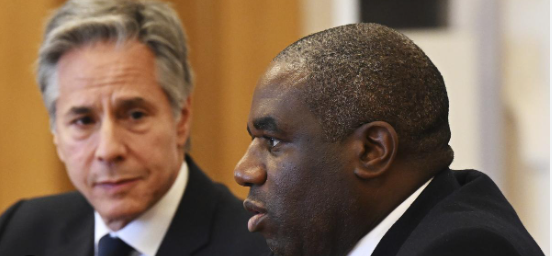Shadow Fleet U.K. Imposes United Kingdom, on Wednesday, intensified its efforts to curb Russian financial resources by announcing sanctions on 10 additional oil tankers in Russia’s “shadow fleet.” These vessels have allegedly been circumventing Western sanctions, enabling Russia to continue profiting from oil exports despite international restrictions. The sanctions coincide with a strategic trip to Kyiv by U.K. Foreign Secretary David Lammy and U.S. Secretary of State Antony Blinken, reinforcing the West’s commitment to tightening the economic screws on Russia amidst the ongoing war in Ukraine.
This move by the U.K. government is part of a broader and coordinated effort among Western nations to cripple the Russian economy, specifically targeting the country’s critical petroleum industry. The announcement follows a series of sanctions unveiled by the U.K., France, and Germany, which focused on curbing Iran’s role in supplying missiles to Russia. The sanctions mark yet another chapter in the West’s ongoing battle to weaken Russia’s financial clout, which continues to fund its war efforts in Ukraine.
As the world watches these developments, the significance of these sanctions cannot be overstated. The targeting of Russian oil tankers not only challenges Moscow’s ability to maintain its oil exports but also sends a strong signal to other global powers, including India, one of Russia’s largest oil customers, to reconsider their energy dealings with Moscow. In this article, we’ll explore the strategic implications of these new sanctions, the role of Russian oil in the war economy, and the global responses to this development.
The U.K.’s Targeting of Russia’s “Shadow Fleet”: A Strategic Blow
The United Kingdom’s decision to sanction Russia’s “shadow fleet” of oil tankers highlights the complexity of enforcing international sanctions and the lengths to which Russia has gone to bypass them. These shadow fleet tankers, numbering around 600 in total, have been instrumental in ensuring the continued flow of Russian oil to global markets despite sanctions imposed by Western nations.
On Wednesday, the U.K. announced sanctions against 10 more of these vessels, bringing the total number of ships on its proscribed list to 25. These tankers will no longer be allowed to dock at U.K. ports, further restricting their operational capacity. This move comes as a response to Russia’s ability to keep its oil exports flowing by using this fleet to evade sanctions. The tankers transport oil under false flags or through intermediary nations, allowing Russian oil to reach markets where it would otherwise be restricted.
David Lammy, the U.K.’s Foreign Secretary, underscored the importance of disrupting this illicit economic system, stating, “Putin’s war machine is funded by a dark and illicit economic system that this government is committed to destabilising.” By sanctioning these vessels, the U.K. aims to increase the costs of Russia’s oil operations and make it more difficult for the Kremlin to profit from its natural resources. 
The Role of Russian Oil in Funding the War
Russia’s oil and gas industry is the backbone of its economy, generating a substantial portion of the country’s revenue. In the context of the ongoing war in Ukraine, these oil exports are crucial to funding the Kremlin’s military operations. According to estimates, Russia’s shadow fleet has transported more than $5 billion worth of oil since the war began in February 2022. This flow of revenue continues to fuel Moscow’s war effort, despite the heavy sanctions imposed by the West.
The European Union (EU) and Group of Seven (G-7) countries, including the U.K., have been at the forefront of U.S.-led sanctions targeting Russian oil. One of the most significant measures has been the price cap of $60 per barrel of Russian oil, which was introduced by the G-7 in December 2022. This cap is designed to limit Russia’s ability to generate high profits from its oil exports while still allowing the global market to access Russian oil at a reduced price.
Despite these efforts, Russia has managed to continue exporting oil through its shadow fleet, highlighting the challenges of enforcing sanctions on such a vast and vital industry. The shadow fleet’s ability to evade sanctions through deceptive practices and complex supply chains has forced Western nations to adopt new measures, such as the ones announced by the U.K., to counter these loopholes.
The Broader Western Strategy Against Russia
The U.K.’s sanctions on Russian oil tankers are part of a broader and coordinated Western strategy to weaken Russia’s economic foundations. This strategy includes a wide range of measures targeting different sectors of the Russian economy, from banking and finance to military supplies and technology.
One notable aspect of this strategy is the recent sanctions imposed by the U.K., France, and Germany against Iran for supplying missiles to Russia. These sanctions are aimed at curbing Russia’s access to advanced weaponry and technology that could be used in its military operations in Ukraine. The connection between Iran and Russia in this context further illustrates the complexity of the sanctions regime, as multiple global players are involved in supporting Moscow’s war effort.
By targeting both Russia’s oil exports and its access to foreign military supplies, the West is attempting to choke off the two critical lifelines that support the Kremlin’s war machine. The sanctions on the shadow fleet are thus a key part of this broader strategy, as they strike directly at the heart of Russia’s oil-exporting capacity.
India’s Role in Russian Oil Exports: A Complex Dilemma
One of the most significant factors in Russia’s ability to continue exporting oil despite Western sanctions is the role played by countries outside the U.S.-led sanctions regime. India, in particular, has emerged as one of the top purchasers of Russian oil, a move that has drawn criticism from Western nations but has been defended by New Delhi on grounds of national interest and market dynamics.
India’s energy needs are vast, and the country has argued that purchasing Russian oil is essential to ensuring its energy security. In the aftermath of the war in Ukraine, Russia has offered its oil to India at discounted prices, making it an attractive option for the Indian government. This decision, however, has put India in a difficult diplomatic position, as it must navigate its relationships with both Russia and the West.
During Prime Minister Narendra Modi’s visit to Kyiv in August, Ukrainian President Volodymyr Zelenskyy urged India to stop purchasing Russian oil. However, India’s stance on the issue has remained unchanged, with New Delhi continuing to prioritize its own energy needs over international pressure to isolate Russia.
The U.K.’s sanctions on the shadow fleet, while primarily aimed at disrupting Russia’s oil exports to the West, also have implications for India. If the sanctions successfully reduce the availability of Russian oil on the global market, India may be forced to reconsider its reliance on Moscow as a supplier. This could, in turn, have broader geopolitical implications, as India reassesses its energy partnerships in light of the evolving global sanctions landscape. 
The Future of Sanctions and Their Impact on Russia’s Economy
The U.K.’s latest sanctions on Russia’s shadow fleet of oil tankers are a critical step in the West’s ongoing efforts to isolate Moscow economically. However, the effectiveness of these measures remains to be seen. Russia has proven resilient in its ability to circumvent sanctions, using its shadow fleet and other methods to continue exporting oil and generating revenue.
In the long term, the success of these sanctions will depend on the West’s ability to enforce them effectively and close the loopholes that Russia has exploited. The involvement of non-Western countries like India and China, both of which have continued to purchase Russian oil, also complicates the situation. As long as Russia has access to buyers for its oil, it will be able to generate the revenue it needs to sustain its war effort.
That being said, the cumulative impact of the sanctions is likely to take its toll on the Russian economy over time. The cost of maintaining a shadow fleet of tankers, for example, has reportedly exceeded $8 billion—a significant investment that may not be sustainable in the long term, particularly if the U.K. and its allies continue to tighten the screws on Russia’s oil exports.
Conclusion: A Critical Moment in the Economic War Against Russia
The U.K.’s decision to impose sanctions on Russia’s shadow fleet of oil tankers marks a critical moment in the economic war against Moscow. By targeting one of the key mechanisms through which Russia has circumvented sanctions, the U.K. and its allies are sending a clear message: the West is determined to disrupt the flow of Russian oil and weaken the financial foundations of Putin’s war machine.
While the effectiveness of these sanctions will depend on a range of factors, including global enforcement and the role of non-Western countries like India, they represent an important step in the ongoing effort to isolate Russia economically. As the war in Ukraine continues, the battle for control of Russia’s financial resources will remain a central aspect of the broader geopolitical struggle. ALSO READ:- Ex-Google Executive’s 2009 Ambition to ‘Crush’ Competition Revealed in Trial Evidence: Analyzing the Implications for Antitrust and Corporate Strategy






мостбет chrono http://mostbet6006.ru .
1win официальный https://1win6001.ru .
1 вин про https://familyclub.borda.ru/?1-6-0-00002163-000-0-0-1743051813/ .
1win мобильная версия сайта http://familyclub.borda.ru/?1-6-0-00002163-000-0-0-1743051813 .
mostbet casino https://mostbet6006.ru/ .
служба поддержки мостбет номер телефона http://mostbet6006.ru/ .
вход 1win вход 1win .
партнёрка 1win http://www.1win6001.ru .
1win кыргызстан http://1win6049.ru .
сайт 1win https://balashiha.myqip.ru/?1-12-0-00000437-000-0-0-1743258848/ .
1вин вход с компьютера 1вин вход с компьютера .
1win партнерка вход http://www.1win6049.ru .
1winn https://1win6049.ru .
1win.pro 1win.pro .
1win личный кабинет https://balashiha.myqip.ru/?1-12-0-00000437-000-0-0-1743258848 .
1win партнёрка http://www.alfatraders.borda.ru/?1-0-0-00004932-000-0-0-1743258210 .
1вин официальный сайт мобильная https://alfatraders.borda.ru/?1-0-0-00004932-000-0-0-1743258210 .
1win на телефон https://obovsem.myqip.ru/?1-9-0-00000059-000-0-0-1743051936/ .
скачать mostbet скачать mostbet .
1 win pro https://www.1win6050.ru .
1win официальный сайт регистрация 1win официальный сайт регистрация .
что делать с бонусным балансом на 1win https://obovsem.myqip.ru/?1-9-0-00000059-000-0-0-1743051936/ .
mostbet chrono http://www.svstrazh.forum24.ru/?1-18-0-00000136-000-0-0-1743260517 .
mostbet kg отзывы http://www.svstrazh.forum24.ru/?1-18-0-00000136-000-0-0-1743260517 .
1 win pro 1 win pro .
1win pro http://1win6050.ru .
что такое 1win http://1win6051.ru .
1win. pro https://1win6051.ru/ .
1 вин вход http://1win6052.ru .
1winn http://1win6051.ru .
1win kg скачать https://www.1win6052.ru .
1 win.pro https://1win6052.ru/ .
мостбет кыргызстан mostbet6029.ru .
скачать 1win официальный сайт 1win6053.ru .
1вин кыргызстан https://www.1win6053.ru .
1вин официальный 1вин официальный .
скачат мостбет http://mostbet6033.ru .
1win.pro http://1win5011.ru/ .
cod promoțional 1win http://www.1win5011.ru .
cazino md http://1win5011.ru .
мостбет скачать казино http://www.mostbet6012.ru .
wan win wan win .
служба поддержки мостбет номер телефона http://mostbet6012.ru .
mostber http://mostbet6012.ru .
мостбет скачать казино мостбет скачать казино .
1 win http://1win6009.ru .
казино 1win http://www.1win6009.ru .
Заказать диплом ВУЗа по выгодной цене возможно, обратившись к проверенной специализированной компании. Мы оказываем услуги по производству и продаже документов об окончании любых университетов Российской Федерации. Купить диплом о высшем образовании– dip-lom-rus.ru/uznajte-tsenu-na-diplom-s-reestrom-segodnya/
Мы изготавливаем дипломы любой профессии по приятным тарифам. Цена зависит от выбранной специальности, года выпуска и ВУЗа: mirstalkera.4admins.ru/viewtopic.php?f=50&t=3330
пластиковые окна пластиковые окна .
https://tonersklad.ru
Thanks for the article https://l-spb.ru/
уннв песни слушать уннв песни слушать .
unnv песни unnv песни .
банкротство физлиц bankrotstvo-fiz-lic-moscow.ru .
ипотека под мат капитал http://www.crediteurasia.ru .
ипотека под материнский капитал crediteurasia.ru .
Thanks for the article. Here’s more on the topic https://kaizen-tmz.ru/
Thanks for the article. Here’s more on the topic https://orenbash.ru/
Here’s more on the topic https://bediva.ru/
купить диплом в реестре купить диплом в реестре .
купить аттестат за 11 класс новокузнецк купить аттестат за 11 класс новокузнецк .
Thanks for the article. Here’s more on the topic https://my-caffe.ru/
Advantageous offer https://regadk.dk/wp-content/pages/?obschestvennye_zadachi_v_svyazi_s_ekonomicheskoy_reformoy.html .
Thanks for the article – https://church-bench.ru/
Thanks for the article https://40-ka.ru/
скачать песни уннв скачать песни уннв .
Thanks for the article https://telegra.ph/SHCHuka-na-kukane-Kak-pravilno-ispolzovat-kukan-01-13 .
Website https://photo-res.ru/ .
Website https://useit2.ru/.
Рекомендую почитать – https://angelladydety.getbb.ru/viewtopic.php?f=39&t=60727 .
Website https://jennifer-love.ru/
Website https://fishexpo-volga.ru/ .
Website https://cardsfm.ru/ .
промокоды сегодня
Para cuidar tu salud urinaria con tecnología de vanguardia, consulta la Clínica de Urología Moderna en línea.
лучшие отели в Занзибаре
Para saber cómo se tratan los problemas urinarios hoy en día, consulta la Clínica de Urología Moderna.
En la Clínica de Urología Moderna verás explicados los procedimientos quirúrgicos avanzados de forma sencilla.
La Clínica de Urología Moderna reúne explicaciones de especialistas y testimonios reales para orientarte mejor. Clínica de Urología Moderna